#whatsapp api pricing
Explore tagged Tumblr posts
Text

Explore WhatsApp API pricing with flexible plans designed to fit your business needs. Affordable, scalable solutions for seamless messaging and automation. Visit Now for more details!
0 notes
Text
7 Reasons Why You Should Choose WhatsApp API for Your Business
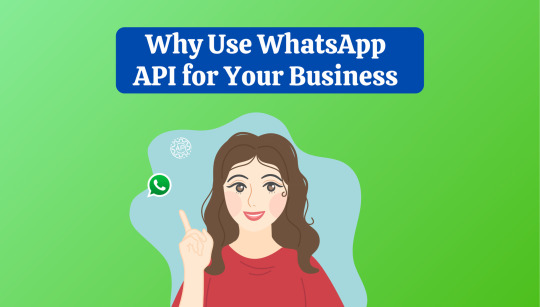
In today’s fast-paced digital world, businesses are constantly looking for better ways to connect with their customers. WhatsApp, being one of the most widely used messaging platforms globally, offers a unique opportunity to engage directly with users. But why should your business consider the WhatsApp API specifically? Here are seven compelling reasons:
1. Reach a Global Audience
With over 2 billion users in 180+ countries, WhatsApp provides a vast global reach. By leveraging the WhatsApp API, businesses can communicate with customers anywhere in the world, breaking down geographical barriers and enhancing accessibility.
2. Enhanced Customer Support
The WhatsApp API enables businesses to offer instant, personalized support. Features like quick replies, chatbots, and automated responses ensure customers receive timely assistance, improving satisfaction and retention.
3. Secure and Reliable Communication
WhatsApp’s end-to-end encryption ensures all conversations are secure. By using the API, businesses can build trust with customers, knowing their data and communications are protected from unauthorized access.
4. Rich Media Support
Unlike traditional SMS, WhatsApp allows businesses to share rich media such as images, videos, PDFs, and interactive buttons. This capability helps create engaging and informative customer experiences that go beyond plain text.
5. Streamlined Notifications and Alerts
The WhatsApp API allows businesses to send real-time notifications, such as order confirmations, delivery updates, and appointment reminders. These proactive communications help keep customers informed and engaged.
6. Integration with CRM and Business Tools
The WhatsApp API can seamlessly integrate with customer relationship management (CRM) systems, chatbots, and other business tools. This integration ensures a unified workflow, improving operational efficiency and providing a holistic view of customer interactions.
7. Cost-Effective Solution
Compared to traditional communication channels like phone calls or SMS, WhatsApp is a cost-effective option. It reduces operational costs while offering a high return on investment (ROI) due to its wide adoption and high engagement rates.
Conclusion
Incorporating the WhatsApp API into your business strategy is more than just a technological upgrade; it’s a way to stay ahead in a competitive market. From its unparalleled reach to its cost-effectiveness and integration capabilities, the API offers numerous benefits that can transform customer communication.
If you’re ready to elevate your customer experience and streamline your operations, now is the time to adopt the WhatsApp API. Your customers are already on WhatsApp—it’s time your business is too.
#whatsapp api#whatsapp automation#whatsapp business api#whatsapp api provider#whatsapp api integration#whatsapp api pricing#whatsapp marketing
0 notes
Text
Understanding WhatsApp API Pricing: A Comprehensive Guide

In today’s digital-first world, effective customer communication is vital for business growth, and WhatsApp has emerged as a powerful platform for reaching customers. With over 2 billion active users, WhatsApp Business API allows companies to connect with their audience seamlessly.
However, understanding WhatsApp API pricing is crucial for businesses looking to integrate this tool into their operations. In this article, we will break down the pricing structure, factors influencing costs, and tips to maximize your investment.
What Is WhatsApp Business API?
The WhatsApp Business API is a solution designed for medium to large businesses to automate, streamline, and enhance their communication with customers. Unlike the standard WhatsApp Business App, the API provides advanced features like automation, integrations, and multi-user access, making it a perfect fit for enterprises.
How Does WhatsApp API Pricing Work?
WhatsApp API pricing is based on a conversation-based model introduced by Meta (formerly Facebook), the company behind WhatsApp. Businesses are charged for the conversations they initiate or respond to on the platform. Here's a breakdown of the key elements:
1. Conversation Categories
WhatsApp divides conversations into two main categories:
User-Initiated Conversations: When a customer messages your business, and you respond within a 24-hour window, it is considered a user-initiated conversation.
Business-Initiated Conversations: When a business sends a message outside of the 24-hour window, it is categorized as a business-initiated conversation.
2. Pricing Based on Regions
The cost per conversation varies depending on the customer’s location. Meta has divided pricing into different tiers based on the region’s economic conditions.
3. Free Conversations
WhatsApp offers 1,000 free conversations per month for businesses to test the platform and manage basic customer interactions. Beyond this, charges apply based on the conversation type and region.
Factors Influencing WhatsApp API Pricing
Several factors affect WhatsApp API pricing, including:
Volume of Conversations: Businesses handling a higher volume of messages may incur higher costs but can negotiate better rates with solution providers.
Type of Conversations: Business-initiated conversations are typically more expensive than user-initiated ones, encouraging businesses to resolve queries within the 24-hour window.
Service Provider Charges: Since the API is accessed through official WhatsApp partners, additional charges for setup, maintenance, and customizations may apply.
Add-Ons and Integrations: Features like chatbots, CRM integration, and analytics tools may come with extra costs, depending on the provider.
Choosing the Right Pricing Plan for Your Business
When evaluating WhatsApp API pricing, it’s essential to align the plan with your business needs. Consider these factors:
1. Business Size
Small businesses with limited conversations might benefit from the free tier or lower conversation volumes. Larger businesses should negotiate volume-based discounts with providers.
2. Usage Frequency
If your business frequently initiates conversations (e.g., sending reminders or promotional messages), budget for higher costs associated with business-initiated messages.
3. Geographic Reach
Evaluate where most of your customers are located. Regions with higher costs may require strategic planning to optimize communication expenses.
4. Solution Provider
Choose a WhatsApp Business Solution Provider (BSP) that offers transparent pricing and minimal additional fees for services.
Maximizing ROI with WhatsApp API
To get the most out of your investment in WhatsApp API pricing, follow these tips:
1. Leverage Automation
Use chatbots to handle repetitive queries, reducing the need for human intervention and lowering costs.
2. Optimize Messaging
Resolve queries within the 24-hour window to minimize the number of business-initiated conversations.
3. Segment Your Audience
Send targeted messages to specific customer segments to enhance engagement and avoid unnecessary communication costs.
4. Monitor Analytics
Track performance metrics to understand message delivery rates, open rates, and conversation efficiency, enabling cost optimization.
5. Utilize Free Tier Effectively
Make the most of the 1,000 free conversations offered each month by prioritizing essential communications.
Comparing WhatsApp API Pricing with Other Platforms
While WhatsApp API pricing might seem complex, it is competitive compared to other communication platforms, considering its reach and engagement rates. Businesses often find that the return on investment (ROI) outweighs the costs due to the platform’s ability to drive personalized and real-time customer interactions.
Conclusion
Understanding WhatsApp API pricing is essential for businesses planning to adopt this powerful communication tool. By evaluating the pricing structure, regional considerations, and additional costs from service providers, businesses can make informed decisions. With proper planning and optimization, the WhatsApp Business API can significantly enhance customer engagement and streamline operations, offering excellent value for money.
If you're considering integrating WhatsApp API into your business, take the time to analyze your needs, compare providers, and create a strategy to maximize the platform’s potential without exceeding your budget.
0 notes
Text
How WhatsApp Automation Helps in Order Management Systems

In today’s fast-paced business environment, efficiency and speed are essential to meet customer expectations. An Order Management System (OMS) plays a crucial role in streamlining order processing, tracking, and delivery. However, businesses are increasingly looking for ways to improve communication and automation in their OMS to enhance customer satisfaction and operational efficiency. This is where WhatsApp automation can play a pivotal role.
WhatsApp, being one of the most widely used messaging platforms, provides a robust channel for businesses to interact with customers. By integrating WhatsApp automation into your Order Management System, you can significantly improve customer engagement, reduce manual work, and ensure smooth order processing. Let’s dive deeper into how WhatsApp automation can benefit your OMS.
What is WhatsApp Automation?
WhatsApp automation refers to using automated tools or software to send messages, trigger responses, and interact with customers on WhatsApp without requiring manual intervention. These tools can handle tasks such as order confirmations, status updates, customer support inquiries, and more.
By integrating WhatsApp with your Order Management System, businesses can automate many of the repetitive tasks associated with order processing and customer communication, saving time and resources while enhancing the customer experience.
Benefits of WhatsApp Automation in Order Management Systems
Real-Time Order Updates One of the key benefits of WhatsApp automation in an Order Management System is the ability to send real-time order updates to customers. Automation ensures that customers receive timely notifications at every stage of their order journey, from order confirmation to shipping, tracking, and delivery.
Order Confirmation: As soon as an order is placed, WhatsApp automation can send a personalized confirmation message to the customer, reassuring them that their order is being processed.
Shipping Updates: Automation can notify customers when their order is dispatched and provide them with a tracking number, ensuring that they are informed about the status of their order.
Delivery Notifications: WhatsApp automation can send real-time updates when the order is out for delivery, giving customers a precise delivery window and even the name of the delivery agent.
This level of transparency leads to improved customer satisfaction and trust, as customers feel informed and in control of their purchases.
Instant Customer Support WhatsApp automation can integrate with your Order Management System to provide instant customer support. With automated responses, customers can get quick answers to their queries regarding order status, delivery times, stock availability, and more.
FAQs: Frequently asked questions regarding order processes can be answered immediately through automated messages.
Order Tracking: Customers can simply inquire about the status of their order by sending a message, and WhatsApp automation will automatically provide them with the current status or tracking details.
This reduces the need for customers to wait for human agents, which can enhance overall customer experience and reduce the workload of customer service teams.
Streamlined Order Processing With WhatsApp automation integrated into your OMS, order processing becomes faster and more efficient. For example, after an order is placed, WhatsApp automation can immediately send an acknowledgment and update the system to reflect the new order status. Additionally, when the order is shipped or delivered, automation can update both the OMS and the customer, reducing human errors and ensuring accurate record-keeping. Automation also eliminates the need for manual data entry, freeing up valuable time for staff to focus on more complex tasks.
Personalized Customer Experience Personalization is key to building strong customer relationships. WhatsApp automation can be set up to send personalized messages, such as addressing customers by their name or providing order-specific information. This makes customers feel valued and creates a more tailored experience. For instance, a message like “Hello [Customer Name], your order #[Order Number] is on its way and will arrive by [Delivery Date]. Thank you for shopping with us!” makes the customer feel important, and this level of communication can significantly improve customer loyalty.
Order Reminders and Follow-Ups WhatsApp automation allows businesses to send reminders and follow-up messages to customers regarding their orders. Whether it’s a reminder for an abandoned cart or a follow-up message after the product has been delivered, automation ensures that the message is sent at the right time.
Abandoned Cart Reminders: If a customer adds products to their cart but doesn’t complete the checkout, WhatsApp automation can remind them with a personalized message, potentially encouraging them to finalize the purchase.
Post-Delivery Follow-Ups: After delivery, businesses can send follow-up messages asking for feedback, reviews, or ensuring the customer is satisfied with the product.
This proactive approach helps businesses maintain continuous engagement with customers and increases the chances of repeat purchases.
Reduced Operational Costs WhatsApp automation reduces the need for manual intervention in order management tasks, which leads to lower operational costs. With automation handling tasks like order confirmation, tracking, and notifications, businesses can operate more efficiently without relying heavily on human resources. Automation also helps prevent errors that may result in order delays or customer dissatisfaction, saving time and money spent on correcting mistakes.
Better Order Management Insights By automating order-related messages and tracking the interactions through WhatsApp, businesses can gain valuable insights into their order management process. WhatsApp automation tools can generate reports on delivery times, customer inquiries, and satisfaction levels, allowing businesses to monitor performance and identify areas for improvement. This data helps optimize the order management process and provides a better understanding of customer behavior, leading to informed business decisions.
How to Implement WhatsApp Automation in Your OMS
Integrate with Your OMS: To get started with WhatsApp automation, you’ll need to integrate your WhatsApp account with your Order Management System. This can typically be done through third-party tools or platforms that offer WhatsApp API integration.
Set Up Automated Workflows: Once integrated, you can configure automated workflows based on customer actions. For example, an order placed will trigger an automatic confirmation message, or an order shipped will send a delivery notification.
Personalize the Messages: Ensure that your automated messages are personalized to make the customer experience more engaging. Use customer names, order details, and specific delivery information to enhance communication.
Monitor and Optimize: Continuously monitor the performance of your WhatsApp automation system. Track metrics like customer response rates, delivery accuracy, and order feedback to improve your processes and automation workflows.
Conclusion
WhatsApp automation is a game-changer for businesses looking to optimize their Order Management System. By automating key communication processes such as order updates, customer support, and order reminders, businesses can improve operational efficiency, enhance customer experience, and reduce costs.
Incorporating WhatsApp automation into your OMS not only saves time and resources but also ensures that your customers stay informed and engaged throughout their entire journey. With its vast reach and ease of use, WhatsApp is an ideal platform to integrate into your order management processes and take your business to the next level.
#WhatsApp Business API#WhatsApp API Integration#WhatsApp Automation#WhatsApp Marketing#WhatsApp Messaging API#WhatsApp Business Solutions#WhatsApp Customer Support#WhatsApp API Pricing#WhatsApp Chatbot#WhatsApp API for Enterprises
1 note
·
View note
Text
Why Your Business Needs WhatsApp API: Best Providers in India & Pricing
In today s fast-paced digital world, businesses are constantly seeking innovative ways to engage with their customers. WhatsApp API has emerged as a game-changer, enabling businesses to streamline their communication, enhance customer experience, and drive growth. This article will delve into the importance of WhatsApp API, its benefits, and a look at the best providers in India. We’ll also discuss WhatsApp API pricing to help you make an informed decision.
What is WhatsApp API?
WhatsApp API is a powerful tool designed for medium and large businesses to connect with their customers. Unlike the regular WhatsApp Business app, the API offers advanced features that allow businesses to automate messages, manage bulk communications, and integrate with CRM systems.
Businesses can use WhatsApp API for:
Sending notifications and alerts.
Providing customer support through chatbots.
Running marketing campaigns.
Managing bulk messaging efficiently.
For more details, explore WhatsApp API.
Why Your Business Needs WhatsApp API
The popularity of WhatsApp in India, with over 500 million users, makes it a must-have platform for businesses. Here’s why your business needs WhatsApp API:
1. Seamless Communication
WhatsApp API allows you to send and receive messages directly with customers in real-time. It ensures faster response times, improving customer satisfaction and retention.
2. Automation and Efficiency
With WhatsApp API, businesses can integrate chatbots to handle common queries automatically. This reduces the workload on support teams and ensures 24/7 availability.
3. Enhanced Customer Engagement
Interactive features like quick reply buttons, multimedia messaging, and personalized notifications help you engage customers effectively.
4. Secure Communication
WhatsApp API offers end-to-end encryption, ensuring customer data privacy and secure interactions.
5. Scalability
Whether you’re a startup or an enterprise, WhatsApp API can handle large volumes of messages, making it a scalable solution for growing businesses.
Features of WhatsApp API
Message Templates: Send pre-approved templates for transactional and promotional messages.
Rich Media Support: Share images, videos, and PDFs to create engaging conversations.
Two-Way Communication: Enable customers to respond to your messages directly.
Multi-Agent Support: Allow multiple agents to handle customer interactions simultaneously.
CRM Integration: Integrate with tools like Salesforce, HubSpot, or Zoho for streamlined workflows.
Best WhatsApp API Providers in India
Finding the right provider is crucial to leveraging the benefits of WhatsApp API. Here are some of the best providers in India:
1. FastSMSIndia
Website: FastSMSIndia WhatsApp API
Why Choose Them: FastSMSIndia offers a robust WhatsApp API solution with competitive pricing, 24/7 support, and easy integration options.
2. Twilio
Features: Scalable API, global messaging support, and reliable infrastructure.
Best For: Enterprises with global reach.
3. Gupshup
Features: Advanced chatbots, omnichannel messaging, and easy-to-use APIs.
Best For: Businesses seeking rich features and customization.
4. Karix
Features: Multi-language support, detailed analytics, and automated workflows.
Best For: Small to medium-sized businesses.
5. Kaleyra
Features: Rich media messaging, template management, and seamless integration.
Best For: Enterprises looking for a reliable and feature-rich platform.
Each provider offers unique benefits, and your choice should depend on your business size, requirements, and WhatsApp API pricing.
WhatsApp API Pricing in India
The cost of using WhatsApp API varies based on the provider, message volume, and type of messages sent. Generally, pricing is structured as follows:
Setup Fees: Some providers charge a one-time setup fee.
Per-Message Charges:
Session Messages: Messages exchanged within a 24-hour window are usually cheaper.
Template Messages: These are pre-approved messages for notifications or promotions, typically priced higher.
Monthly Subscription: Many providers offer subscription plans with additional features like analytics and support.
To get the most accurate and affordable pricing, visit WhatsApp API Pricing.
How to Choose the Best WhatsApp API Provider
Scalability: Ensure the provider can handle your business’s growth and increasing message volumes.
Features: Look for advanced features like chatbot integration, multimedia support, and detailed analytics.
Pricing: Compare pricing plans to ensure they fit within your budget.
Support: Opt for a provider offering 24/7 customer support to resolve issues quickly.
Integration: Check if the API integrates seamlessly with your existing CRM or marketing tools.
Benefits of Using WhatsApp API for Businesses
Improved Customer Experience: Personalized and timely communication fosters trust and loyalty.
Cost Efficiency: Automating responses reduces the need for large support teams.
Higher Conversion Rates: Engaging messages and quick replies lead to better conversions.
Global Reach: WhatsApp API allows you to connect with customers across the globe.
Frequently Asked Questions
1. What is WhatsApp API used for? WhatsApp API is used for automating communication, sending notifications, and managing large-scale messaging for businesses.
2. How much does WhatsApp API cost in India? Pricing varies depending on the provider and usage. Check detailed pricing at WhatsApp API Pricing.
3. Can small businesses use WhatsApp API? Yes, small businesses can benefit from WhatsApp API by using scalable and cost-effective solutions.
4. How do I integrate WhatsApp API? Integration typically involves working with a provider, setting up templates, and connecting the API to your CRM.
Conclusion
WhatsApp API is a powerful tool that every modern business should consider for improving customer engagement and communication. By choosing the best WhatsApp API provider in India and understanding WhatsApp API pricing, you can unlock the full potential of this platform to drive growth and customer satisfaction. Whether you’re a small business or a large enterprise, investing in WhatsApp API is a step toward building a stronger digital presence.
0 notes
Text
0 notes
Text
Using WhatsApp API: A Complete Guide!!!
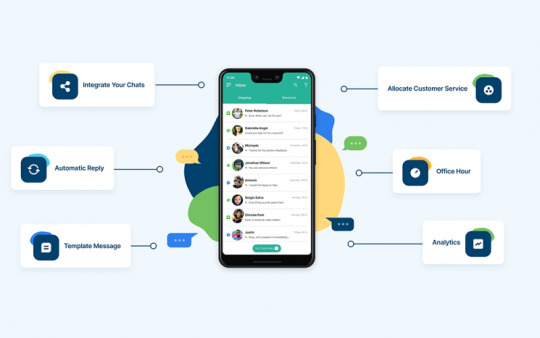
This blog post articles covers - As To Difference Between WhatsApp Business V/s WhatsApp API, How WhatsApp API Works, Technical Flow, Integration Steps and Pricing Considerations.
WhatsApp, with over 2 billion active users worldwide, has become a go-to platform for businesses to engage with their customers. The introduction of the WhatsApp Business API has further enhanced the platform's usability for enterprises by enabling seamless communication, automation, and integration with existing systems. In this article, we delve into how the WhatsApp API works, its technical flow, integration steps, and pricing considerations, providing a comprehensive guide for businesses aiming to leverage this tool.
Difference Between WhatsApp Business & WhatsApp API:
WhatsApp Business and WhatsApp Business API differ primarily in their purpose and functionality. WhatsApp Business is a free-to-use app designed for small businesses to manage customer interactions, offering features like quick replies, labels, and catalogues to showcase products or services. It is ideal for businesses with straightforward communication needs and limited scale.
On the other hand, WhatsApp Business API is tailored for medium to large enterprises, enabling advanced features such as automated messaging, integration with CRM tools, multi-agent support, and bulk messaging through approved templates. Unlike the app, the API requires third-party service providers for setup and is designed to handle large-scale customer interactions with a focus on automation and scalability.
Understanding How WhatsApp API Works:
Unlike the WhatsApp Business App designed for small businesses, the WhatsApp API is tailored for medium to large enterprises. It’s not a standalone application but an interface that allows businesses to integrate WhatsApp messaging into their own systems, such as CRM software, chatbots, and customer support platforms.
Key features of the WhatsApp API include: Two-Way Messaging: Businesses can send and receive messages to and from customers.
Rich Media Support: It supports text, images, videos, documents, and interactive buttons.
Automation: You can set up automated responses, chatbots, and workflows.
Security: Messages are encrypted end-to-end, ensuring privacy.
The WhatsApp API enables businesses to interact with customers at scale while maintaining the user-friendly and secure nature of the platform.
Technical Flow Of WhatsApp API:
The WhatsApp API’s technical flow involves several components:
Client Application: The business’s system (CRM, chatbot, or custom-built app) initiates communication.
WhatsApp Business API Client: This serves as the bridge between the client application and the WhatsApp servers. It processes API requests and responses.
WhatsApp Server: The server validates and delivers messages to users’ WhatsApp accounts.
Webhooks: The WhatsApp API uses webhooks to send real-time updates, such as message delivery statuses or user responses, back to the business’s system.
Flow Example:
A customer sends a query to the business’s WhatsApp number.
The WhatsApp server forwards the message to the API client.
The API client processes the message and triggers the necessary business logic (e.g., retrieving data from a CRM).
The client application formulates a response, which is sent back to the WhatsApp server via the API client and then delivered to the customer.
Integration Steps for WhatsApp API: Integrating WhatsApp API into your system involves several steps. Here’s a detailed guide:
Set Up a WhatsApp Business Account
Register your business with WhatsApp through a Business Solution Provider (BSP) like Twilio, Vonage, or Meta’s Cloud API.
Verify your business details, including your Facebook Business Manager account and phone number.
Choose a Business Solution Provider (BSP)
BSPs provide hosted solutions for the WhatsApp API, simplifying the setup and maintenance.
Consider factors like pricing, features, and scalability when choosing a BSP.
Install and Configure the API Client
If using an on-premise solution, install the WhatsApp API client on your server.
Configure the API client with your business’s phone number, access credentials, and webhook URLs.
WhatsApp API Integration:
WhatsApp API Integration - use the BSP’s API documentation to integrate WhatsApp into your CRM, ERP, or other systems.
Set up webhooks to receive real-time updates and events.
Design Messaging Templates
WhatsApp requires pre-approved templates for outbound notifications, such as order updates or reminders.
Submit these templates for review and approval through your BSP.
Testing and Deployment
Test the integration in a sandbox environment to ensure messages are delivered and received as expected.
Deploy the solution and monitor its performance.
Pricing Considerations:
WhatsApp API pricing is structured differently from the free WhatsApp Business App. Here are the key components:
Per Conversation Pricing
WhatsApp charges based on 24-hour conversation sessions, categorized into:
User-Initiated Conversations: Started when a customer messages the business.
Business-Initiated Conversations: Started when the business sends a message outside a customer-initiated session.
Region-Specific Rates
Conversation costs vary by region, with higher rates in developed markets and lower rates in emerging markets.
BSP Fees
BSPs typically charge additional fees on top of WhatsApp’s costs. These may include:
Monthly subscription fees.
Setup fees.
Usage-based fees for API requests.
Free Tier
WhatsApp offers a limited number of free conversations each month, typically for user-initiated interactions.
Additional Costs
Consider indirect costs, such as the development and maintenance of integrations, hosting fees, and chatbot development.
Conclusion:
The WhatsApp API is a powerful tool for businesses aiming to enhance customer engagement and streamline communication processes. By understanding its technical flow, following the integration steps, and carefully evaluating pricing considerations, businesses can unlock its full potential. With thoughtful planning, the WhatsApp API can become a cornerstone of your customer communication strategy, delivering value and satisfaction at scale.
0 notes
Text
WhatsApp API Pricing Plans at Chatvertise
Check out Chatvertise for competitive WhatsApp API pricing options. Find flexible plans designed to meet your business needs, enabling efficient communication and customer engagement. Visit for details!
0 notes
Text
#whatsapp bulk message#whatsapp api#whatsapp business api#WhatsApp Business Solution#Go4whatsup Pricing#WhatsApp API Pricing#WATI pricing#AiSensy Pricing
0 notes
Text
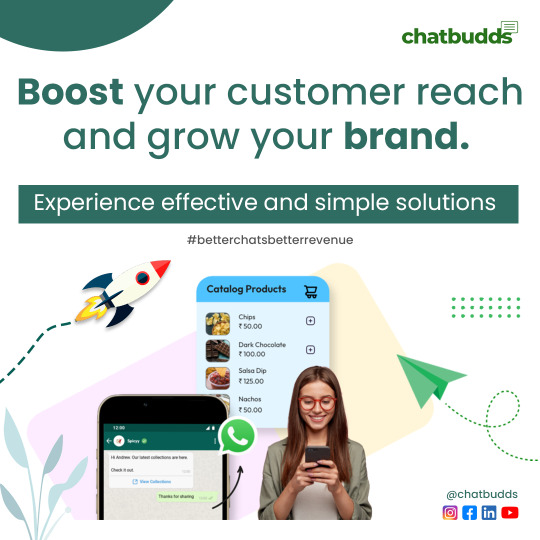
Websites with live chats enhance customer support by providing real-time assistance, improving user experience and satisfaction.
#whatsapp marketing tools#whatsapp marketing#whatsapp marketing software#whatsapp crm#whatsapp for business#whatsapp business marketing#whatsapp business tools#whatsapp chatbot pricing#whatsapp platform for business#whatsapp integration for business#whatsapp business api#whatsapp api pricing#whatsapp marketing api#websites with live chats#bot live chat
0 notes
Text
Whatsapp api pricing
WhatsApp API pricing varies depending on the provider and the specific needs of businesses. Typically, pricing is structured based on factors such as message volume, message type (template or session), and additional features required. Providers may offer tiered pricing plans with options for monthly subscriptions or pay-as-you-go models. Costs may include setup fees, messaging fees per message sent, and additional charges for premium features like media messaging or customer support. WhatsApp API pricing aims to offer businesses scalable and flexible solutions for integrating WhatsApp into their communication strategies while ensuring cost-effectiveness and value for money.
0 notes
Text
How do I request WhatsApp API
To request access to the WhatsApp API (WhatsApp Business API), you need to go through a process provided by WhatsApp's parent company, Meta (formerly Facebook). Here's a general overview of the steps you can take to request access:
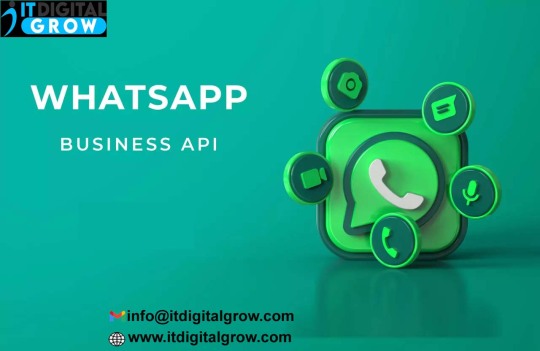
Create a Business Account: Ensure that you have a business account for your company on WhatsApp. If you don't have one, you can create one by downloading the WhatsApp Business app from the Google Play Store or Apple App Store and following the setup process.
Review Requirements: Review the requirements and guidelines for using the WhatsApp Business API. These may include having a registered business entity, adhering to WhatsApp's policies and terms of service, and complying with data protection regulations.
Choose a Provider: Decide whether you want to work with a WhatsApp Business Solution Provider (BSP) or directly with WhatsApp. BSPs are third-party service providers authorized by WhatsApp to offer API integration services and support.
Contact a Provider or Apply Directly: If you choose to work with a BSP, you can contact them to inquire about accessing the WhatsApp API and discuss your business needs. They will guide you through the application process and provide assistance with integration and setup. If you prefer to apply directly, you can visit the WhatsApp Business API website and submit an application.
Submit Application: Provide the necessary information about your business, including your company name, website, business type, use case for using the API, estimated message volume, and other relevant details. Be prepared to verify your identity and business ownership.
Wait for Approval: After submitting your application, you will need to wait for approval from WhatsApp or your chosen BSP. Approval times may vary, and you may be required to provide additional documentation or clarification during the review process.
Complete Integration: Once your application is approved, you can proceed with integrating the WhatsApp API into your systems or applications. This may involve working with your BSP or following the technical documentation provided by WhatsApp.
Start Using the API: Once integration is complete, you can start using the WhatsApp API to send and receive messages, provide customer support, and engage with your customers on the WhatsApp platform.
It's important to note that access to the WhatsApp API is subject to approval, and not all businesses may be eligible. Additionally, there may be costs associated with using the API, such as messaging fees and service charges from WhatsApp or your chosen BSP. Be sure to review all terms and pricing information before proceeding with your application.
0 notes
Text
How to Manage Orders on WhatsApp Using API: A Step-by-Step Guide

In the modern digital age, businesses are constantly looking for new ways to engage with customers and streamline their processes. WhatsApp, being one of the most popular messaging platforms globally, offers a unique opportunity to manage customer orders directly through its API. With WhatsApp Business API, businesses can automate and simplify order management, leading to better customer experiences and increased efficiency. In this article, we’ll discuss how to effectively manage orders on WhatsApp using its API and integrate it into your business.
Why Use WhatsApp Business API for Order Management?
WhatsApp has become more than just a messaging app; it’s a powerful tool for customer interaction, especially for businesses. With the WhatsApp Business API, companies can automate interactions, send personalized notifications, and handle customer inquiries—all in real-time. Using WhatsApp for order management has several advantages:
Direct Communication: Customers prefer messaging over phone calls or emails. WhatsApp allows businesses to communicate directly and instantly.
Automation: Businesses can automate the order process, reducing human error and increasing operational efficiency.
Integration with Other Systems: WhatsApp API can be integrated with inventory management systems, payment gateways, and more.
Real-Time Updates: Send order confirmations, shipping updates, and reminders directly to customers.
Step 1: Set Up WhatsApp Business API
The first step to managing orders via WhatsApp is setting up the WhatsApp Business API. Unlike the regular WhatsApp Business app, the API requires some technical setup and can be used only with approved providers or through self-hosting.
Here’s how to get started:
Apply for WhatsApp Business API Access: Submit a request on WhatsApp’s official website to gain access to the API. You will need to provide business details, including phone numbers and other information for verification.
Choose a Service Provider or Self-Hosting: You can either use a third-party service provider or host the API yourself. Service providers offer ready-to-use solutions with fewer technical challenges.
Integration with Your Systems: To effectively manage orders, the WhatsApp API must be integrated with your order management system, CRM, and payment gateways. This step enables automated responses, such as order confirmations, status updates, and payment requests.
Step 2: Automate Order Management with Chatbots
One of the most powerful features of the WhatsApp Business API is the ability to use chatbots to automate order management. With the help of AI and machine learning, chatbots can handle routine tasks such as taking orders, sending order confirmations, and answering FAQs.
Order Placement: Customers can place orders by simply messaging your business. Chatbots can ask customers for their preferred products, quantities, and delivery addresses, making the process seamless.
Order Confirmation: Once the order is placed, an automated message can confirm the details, including the products ordered, prices, and estimated delivery time.
Payment Integration: The WhatsApp API can integrate with payment gateways to allow customers to pay directly through the chat. This integration ensures smooth transactions and reduces friction in the order process.
Order Status Updates: Chatbots can automatically send updates about order status, such as "Order shipped" or "Out for delivery," keeping customers informed at all times.
Step 3: Real-Time Customer Support
While automation helps speed up the order process, human support is still essential. WhatsApp API allows you to provide real-time customer support through live chats. This is particularly useful for handling queries regarding products, shipping, or payment issues.
Live Chat Integration: Businesses can connect their customer support team to the WhatsApp API for real-time assistance. Whether it’s answering specific product-related questions or resolving an issue, WhatsApp makes it easy for customers to reach out.
Personalized Communication: Using WhatsApp, you can maintain a personal connection with customers. Sending personalized order updates, promotional offers, or thank-you messages enhances customer satisfaction and loyalty.
Step 4: Leverage Analytics and Reporting
The WhatsApp Business API also provides businesses with valuable insights through analytics. By tracking messages, orders, and customer interactions, businesses can improve their processes and offer better service.
Order Data Analytics: Track the number of orders placed, customer preferences, and peak order times to optimize inventory and streamline your order management system.
Customer Feedback: Collect customer feedback through WhatsApp surveys or direct messages. This can help identify areas for improvement in your order process.
Best Practices for Managing Orders on WhatsApp
Ensure Quick Response Times: Customers expect quick replies, especially when placing or checking on orders. Use automated messages or chatbots to acknowledge orders and provide instant responses.
Be Transparent: Always keep customers updated about their order status. Transparency about delivery times, availability, and product details builds trust and improves customer satisfaction.
Offer Payment Flexibility: Integrating various payment methods through WhatsApp makes it easier for customers to complete their purchases.
Secure Data Handling: Ensure that customer data, including payment details and personal information, is securely managed in compliance with privacy regulations like GDPR.
Conclusion
Managing orders on WhatsApp using its API is a game-changer for businesses, providing a seamless, automated, and personalized customer experience. By integrating the WhatsApp Business API into your order management system, you can boost efficiency, enhance customer satisfaction, and ultimately drive business growth. As more consumers prefer the convenience of messaging apps, adopting WhatsApp for order management can help you stay ahead in a competitive market.
Start automating your order management process today and provide your customers with the speed and convenience they crave!
#whatsapp automation#whatsapp api integration#whatsapp api#whatsapp business api#whatsapp api provider#whatsapp api pricing#whatsapp marketing#order management software
0 notes
Text
What is the Best WhatsApp Business API?

View On WordPress
0 notes
Text
ZippyMsg WhatsApp Business API sends and receives messages, media and marketing campaigns. The best partner to develop the WhatsApp & Unofficial WhatsApp API that suits you ZippyMsg is a WhatsApp API provider and a gateway for working with messages.
#Whatsapp bulk message#Whatsapp api pricing#Whatsapp automation#Automatic whatsapp message sender#Auto whatsapp message sender#Unlimited whatsapp message sender#Whatsapp api for sending messages#Whatsapp business solution provider#Whatsapp automation tool#Whatsapp api indonesia#Whatsapp api to send message#api whatsapp send#Automated whatsapp message#Whatsapp official api#Whatsapp api integration#https://zippymsg.com/
0 notes
Text
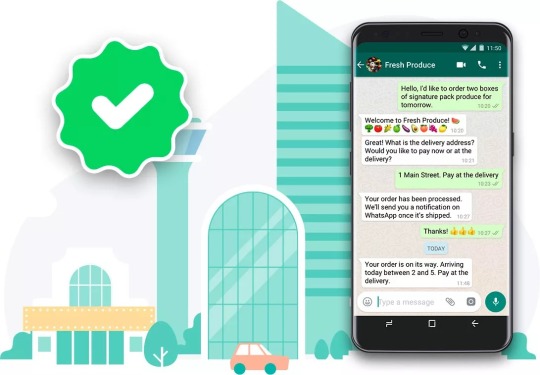
WhatsApp API Integration enables businesses to host an account on a server and integrate it with its own chatbots and systems. Know about WhatsApp Business API Pricing now!
0 notes